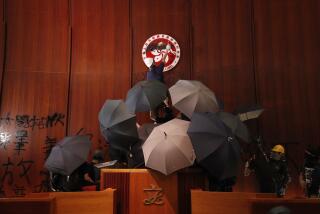3 Egyptian activists get prison terms for protesting
CAIRO â An Egyptian court on Sunday sentenced three prominent activists to three-year prison terms and heavy fines, in what was seen as the latest worrying sign of the military-backed governmentâs determination to suppress political dissent.
The three â Ahmed Maher, Mohammed Adel and Ahmed Douma â are best known for leading roles in the 2011 uprising that toppled autocratic President Hosni Mubarak. They were arrested for demonstrating in late November against a new law that in essence criminalizes street protests, and their sentences, the maximum penalty allowed, were the first ones levied under it.
The unexpectedly long jail terms provoked dismay among rights advocates, who have been feeling increasingly under siege at the hands of the government, despite its promises to set the country on the path to democracy. The April 6 Youth Movement, of which Maher was a cofounder, denounced the court proceedings.
âA three-year sentence is for criminals or drug dealers, not a political activist who was one of the driving forces behind the revolution,â the movementâs general coordinator, Amr Ali, said at a news conference.
Critics of the law restricting protests have pointed out that the current interim government owes its existence to massive nationwide rallies against Islamist President Mohamed Morsi, which paved the way for a July 3 military coup against him. The architect of that coup, Gen. Abdel Fattah Sisi, still enjoys enormous popularity.
Most Egyptians have accepted without complaint the ongoing crackdown against Morsiâs Muslim Brotherhood, and, more recently, against secular activists mounting challenges to the protest law.
Additional charges brought against the three sentenced Sunday included assaulting police officers. The men were also each fined about $7,250. Under the legal system, they can appeal.
The court action comes less than a month before a scheduled nationwide referendum on Egyptâs newly rewritten constitution, a vote seen by the interim government as a crucial test of its legitimacy.
Presidential and parliamentary elections are to follow, and rights activists have said the protest law is aimed at stifling debate and discourse. Maherâs movement said after Sundayâs verdict that it did not believe in the governmentâs âroad mapâ to democracy.
The case also comes against the backdrop of an ongoing legal campaign against Morsi, who now faces three separate trials on an array of charges. The latest of those cases, stemming from a prison break during the uprising against Mubarak, was referred to a criminal court Saturday.
The indictment provoked derision because it included detailed accusations that Morsi and his codefendants had stolen chickens from jailhouse supply stores. Most of the charges Morsi faces, however, are extremely serious, among them espionage and incitement to murder. If convicted, he could face the death penalty.
Hassan is a special correspondent.
More to Read
Sign up for Essential California
The most important California stories and recommendations in your inbox every morning.
You may occasionally receive promotional content from the Los Angeles Times.










